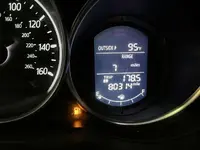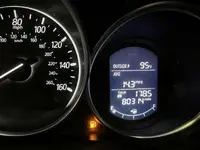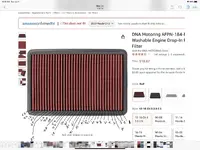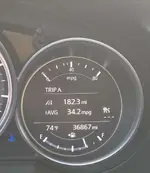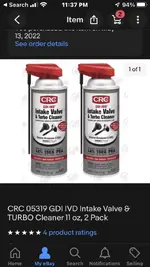You are using an out of date browser. It may not display this or other websites correctly.
You should upgrade or use an alternative browser.
You should upgrade or use an alternative browser.
Average MPG less than 20mpg, am I alone?
- Thread starter StPark
- Start date
- :
- 2021 CX-9 Sig
- :
- 2021 CX-5 GT
Just purchased 2022 touring plus and having same disappointment. My average is 19 on 87 gas. My other car is Audi Q7 2.0 and that one gets better mpg while more power.
I average 24.1 MPG in my 2021 CX-9 Signature, which is similar to your Q7, and my wife averages 26.4 MPG in her 2021 CX-5 GTR.
My car is tracked here:
With a non turbo motor your mileage will get much better. It should be over 25MPG.Just purchased 2022 touring plus and having same disappointment. My average is 19 on 87 gas. My other car is Audi Q7 2.0 and that one gets better mpg while more power.
- :
- 16 CX-5 Tour'ngAWD
... to keep the discussion going, we have a 2016 CX-5 Touring AWD (2.5L NA) and a 2019 WRX (2L turbo)...
in everyday driving; how each car is used, my WRX is beating the Mrs' CX-5. Why?
I drive 30 miles, one way for work. she drive local 4 miles or less with lots of stops/lights/parking lots, etc.
The WRX is getting a solid 29 mpg in mostly highway (on 93 octane)...the CX-5 (on 87 octane) is near 22 around town.
Even on a recent jaunt to Texas (from Ohio in early April), the CX-5 managed 27-ish and change. Speeds were kept to within 5 of posted limits to keep unwanted attention heading our way and, at the time, gas was slowly beginning to creep up, but was still under/at $3/gal.
Now, with that said, in the WRX, when the loud pedal is pushed hard, and I find myself in boost constantly, the mpgs take a big hit. I will be in the lower 20s. Around town driving is not you mpg friend.
Another thing, the proposed (government) talking about adding more ethanol to our fuel is not going to help matters. Sure, great for the corn lobbyists, but not for the end consumer a our overall mpg numbers will go down as more ethanol is added to our gas.
It is bad enough if the "up to 10% " is actually 10% at the pumps right now. I get better mileage on ZERO ethanol fuel (but the corn lobbyists don't like that). Not to mention, what harm is going to happen to my cars' (both of them) fuel system (rubber hoses) if more than 10% of ethanol is added to the fuel? How much ethanol can be added to non-flex fuel cars before irreversible, catastrophic damage occurs to the rubber fuel lines (that can withstand some exposure to 10% or less of ethanol, but not more).
So, highway driving better than in-town stop and go.
Summer driving better than winter driving....at least those places that see real winters.
in everyday driving; how each car is used, my WRX is beating the Mrs' CX-5. Why?
I drive 30 miles, one way for work. she drive local 4 miles or less with lots of stops/lights/parking lots, etc.
The WRX is getting a solid 29 mpg in mostly highway (on 93 octane)...the CX-5 (on 87 octane) is near 22 around town.
Even on a recent jaunt to Texas (from Ohio in early April), the CX-5 managed 27-ish and change. Speeds were kept to within 5 of posted limits to keep unwanted attention heading our way and, at the time, gas was slowly beginning to creep up, but was still under/at $3/gal.
Now, with that said, in the WRX, when the loud pedal is pushed hard, and I find myself in boost constantly, the mpgs take a big hit. I will be in the lower 20s. Around town driving is not you mpg friend.
Another thing, the proposed (government) talking about adding more ethanol to our fuel is not going to help matters. Sure, great for the corn lobbyists, but not for the end consumer a our overall mpg numbers will go down as more ethanol is added to our gas.
It is bad enough if the "up to 10% " is actually 10% at the pumps right now. I get better mileage on ZERO ethanol fuel (but the corn lobbyists don't like that). Not to mention, what harm is going to happen to my cars' (both of them) fuel system (rubber hoses) if more than 10% of ethanol is added to the fuel? How much ethanol can be added to non-flex fuel cars before irreversible, catastrophic damage occurs to the rubber fuel lines (that can withstand some exposure to 10% or less of ethanol, but not more).
So, highway driving better than in-town stop and go.
Summer driving better than winter driving....at least those places that see real winters.
- :
- 16 CX-5 Tour'ngAWD
different engine tuning?Another question for the group. The MPG for the CX-50 Turbo is 23/29. I don't understand how it beats the CX-5 Turbo's 22/27 considering it has the same drive train and weighs the same.
better drag coefficient?
different final drive and other gear ratios?
silly methods used by government to make fuel economy test?
simulated driving the actual test loop or real world driving the actual test loop?
start/stop tech?
Do actual cars get driven during the actual fuel economy test or do they run simulations on a computer in a virtual test?
Also, doesn't Mazda test their own cars based on the government's test parameters? As far as I know, the federal government doesn't test the actual cars, the manufactures do.
- :
- 2016 CX-5
I filled my tank yesterday. It cost $54. I reset the trip odometer. It gave an estimated range of a little over 300 miles. I can’t remember the exact amount. I just now had 1 bar of fuel left with an estimated range of 7 miles left. I have driven 178.5 miles since I filled up. I don’t care how hard one May drive their car, an average of 14.3 mpg is ABYSMAL. Please confirm for me, anyone, that this warrants having my vehicle serviced. It’s a 2016 Touring FWD 2.5L.2019 CX-5 Signature Turbo, always use Costco premium 92 octane.
As title says, I'm only getting 18-19 mpg average. I tried to get some decent mileage, intentionally driving like an old man. Well, I'm an old man but it's just too far below the EPA rating. I usually drive 5-10 mile distance on surface road, in small city not much of traffic, occasional freeway driving to 25 miles or so. I expect more than 20 mpg or close to the EPA city rating. The CX-5 has 15,500 miles on it, am I still in break-in period? No other complaints. Oh, once drove 130 mile one way, I got just under 27 mpg on that trip.
Attachments
Try this it seems to have helped….however you have a high performance engine.Mileage will get better. After the first oil change ou should see an increase.
I also use this gauge religiously it shows current MPG when driving. Hope this helps
Attachments
- :
- Mazda
There really are so many variables to what each owner gest for MPG. Most of us don't even know the true weight of our cars which can affect the MPG. Gasoline used i.e. Shell, Chervon etc., and the octane value chosen does affect the MPG because the ECU will adjust somewhat for all those variables. But unless you can go beyond OE Programing (Performance Calibration) MPG is not going to be improved much.
I will say the funniest thing I have read on the subject is that the MPG will increase after the first oil change.
If the % levels of some of the added ingredients worries some of you then use a quality fuel additives like Chervon Techron or other similar high-quality additives. Your MPG may not increase with any notable difference, but you will add greater protection to the fuel system.
I would also make use of the instant MPG monitor and learn to drive with better throttle control which should improve anyone's MPG. And keep with the recommended tire pressure as per MAZDA information in the driver's door jam.
As for aerodynamics', at this point cars are cars, and they are best overall for MPG @ no more then 60MPH. I mean do you really need to get to where you are going a few minutes quicker? Leave earlier! Try doing the math based on 60mpg and distance time arrivals at different speeds and the loss in MPG.
We often get customers vehicles that claim bad MPG. With no DTC or any other found issues. I like these because I tell the crew going for a test drive be back in a couple hours. The privilege of being titled BOSS! So off I go with the Scan tool connected to the OBDII diagnostic connector DATA logging the performance of the engine and specially the MPG. I go up into the hills and return on a flat stretch of less traveled roads. Almost every time my MPG vs the customers is at least 20% greater with NO indication of any abnormalities or engine reduced performance. I simply watch how I use the throttle I do not drive like and old man or really hyper MPG oriented and even throttle up once in a while just to be complete with my evaluation.
The downside is the customers always claims it not how they drive, and they KNOW something is not right with their engine.
I will say the funniest thing I have read on the subject is that the MPG will increase after the first oil change.
If the % levels of some of the added ingredients worries some of you then use a quality fuel additives like Chervon Techron or other similar high-quality additives. Your MPG may not increase with any notable difference, but you will add greater protection to the fuel system.
I would also make use of the instant MPG monitor and learn to drive with better throttle control which should improve anyone's MPG. And keep with the recommended tire pressure as per MAZDA information in the driver's door jam.
As for aerodynamics', at this point cars are cars, and they are best overall for MPG @ no more then 60MPH. I mean do you really need to get to where you are going a few minutes quicker? Leave earlier! Try doing the math based on 60mpg and distance time arrivals at different speeds and the loss in MPG.
We often get customers vehicles that claim bad MPG. With no DTC or any other found issues. I like these because I tell the crew going for a test drive be back in a couple hours. The privilege of being titled BOSS! So off I go with the Scan tool connected to the OBDII diagnostic connector DATA logging the performance of the engine and specially the MPG. I go up into the hills and return on a flat stretch of less traveled roads. Almost every time my MPG vs the customers is at least 20% greater with NO indication of any abnormalities or engine reduced performance. I simply watch how I use the throttle I do not drive like and old man or really hyper MPG oriented and even throttle up once in a while just to be complete with my evaluation.
The downside is the customers always claims it not how they drive, and they KNOW something is not right with their engine.
Last edited:
- :
- 2016 CX-5
I forgot to mention that I had a new engine installed at a Mazda dealer’s service department on 5/31/22. I also put 4 brand new tires on the car on 6/1/22. Also, to respond to @Tribe&TrueRacin ’s comment, the gas mileage I posted was from concrete data collected from my car’s mileage tracker. So, this customer’s claim of poor gas mileage isn’t mere intuition that I “know” something is wrong. He’s not saying that the poor mpg I’m receiving is plausible and normal under any scenario right? I’m not talking about squeezing a couple more mpg outta my vehicle by adjusting the way I drive or using different brands of fluids. Even under the roughest of conditions, no Mazda CX-5 should go only 178.5 miles on a full tank of gas, much less with a brand new engine and 4 new tires…right?
- :
- Mazda
I think I was clear when I said driving it a distance and variable road conditions while DATA Logging the ECU operations that would give insight to any anomalies or in your case concerned low MPG!
- :
- South Carolina
- :
- 21 CX-9 13 CX-5
>depends on the fuel
I saw a study that proved that the higher octane fuels like 92 tended to have a higher concentration of ethanol than the regular 87. And this makes sense, because ethanol does boost the octane rating.
However, a car running on pure gasoline will get better mileage than one running on ethanol, because there isn't nearly as many BTU's of energy in a gallon of ethanol as there is in gasoline. So the engine has to burn more ethanol to go the same distance vs gasoline.
So, with all that said, unless your car specifically calls out an absolute requirement for high octane fuel, you're big time wasting money buying it.
I saw a study that proved that the higher octane fuels like 92 tended to have a higher concentration of ethanol than the regular 87. And this makes sense, because ethanol does boost the octane rating.
However, a car running on pure gasoline will get better mileage than one running on ethanol, because there isn't nearly as many BTU's of energy in a gallon of ethanol as there is in gasoline. So the engine has to burn more ethanol to go the same distance vs gasoline.
So, with all that said, unless your car specifically calls out an absolute requirement for high octane fuel, you're big time wasting money buying it.
- :
- 16 CX-5 Tour'ngAWD
"serviced" is or could mean lots of things....an average of 14.3 mpg is ABYSMAL. Please confirm for me, anyone, that this warrants having my vehicle serviced. It’s a 2016 Touring FWD 2.5L.
Be careful just taking it to the dealer as they will want to pile on a lot of unnecessary services that do little to help you, but do more to help their bottom line.
start with simple stuff. How old/many miles is the engine air filter. If several years old, OR, extremely dirty (like in a high dust area), change the air filter. Please stay away from the oiled K&N filter or simillar. They provide no real advantage to a standard paper filter and can actually cause more headaches...plus paper OE/OE style filters are cheaper.
Have you thrown injector cleaner in the tank to ensure the fuel system is "clean"/"cleaner"? The injector cleaner might drop mpg 1 or 2, but is just more more proactive step in checking off each system.
Have you checked your ECU for trouble codes? Not all codes throw a CEL. Scan your ECU with an OBD-II reader, or take it to a big chain auto parts store, like Autozone, Advance, O'Reilly, or similar and see if their scanner shows any codes. (if codes exist, take it back to the engine installing dealer)
Have you looked at the spark plugs? What condition are they in? Are they still gapped properly to spec? Is it a good time to replace them anyway?
What oil are you running? 0w-20? 5w-30? How old is the oil? Does it meet manufacturer spec (see owners manual)?
Are there any vacuum leaks? Lots of little places for leaks to occur, especially if the below action just happened VVVV .
I forgot to mention that I had a new engine installed at a Mazda dealer’s service department on 5/31/22. I also put 4 brand new tires on the car on 6/1/22.
You said "new engine". Was it a new engine, or one from a parts yard (or low mileage Japanese import)?
And from what year was this engine; same as the car (2016), or older, or newer?
Is there a warranty on that engine or the labor/install?
How many miles/kms on the "new engine"?
It is possible the "new engine" could need a valve cleaning service, aka walnut blasting? Check the tops of the valves first before getting the service done. A lot of garages just use chemicals through the intake to clean the valves vs blasting as the chemicals are "cleaner" and create less of a mess; plus require much less parts removal than the walnut blasting.
I want to ass.u.me, the installing dealer did a relearn on you throttle body...again, an ass.u.mption.
On the new tires, what type/brand? Some tires have more rolling resistance than others, but not so much that a 6-mpg hit is caused. Is the alignment good? Too much toe (in or out) will cause extra drag and hurt your mpg. Again, making an ass.u.mption that the alignment is good (within spec).
What air pressure are you running in the tires? I run 10% over what is on the door sticker; somewhere around 33-34 psi and I'm on Nokian WRG4 SUV tires.
Next up would be the O2 sensors. pull them and take a look. what color are they? Replacing them isn't horrible, but not cheap either. I check prices against RockAuto and see if there are any advantages to buying local vs buying on line, paying shipping, and waiting.
Do you think you have brake drag? how do the brake pads look? yes, I'm throwing out every possible thing I can think of that would/could cause an engine to perform poorly or cause it to work harder, like extra friction/drag.
Getting to a solution could take some time, and could Invlove swapping parts that may or may not improve the situation. but once a part is replaced, you know that is good
- :
- Mazda
This is all mostly accurate information ...^^^^^>depends on the fuel
I saw a study that proved that the higher octane fuels like 92 tended to have a higher concentration of ethanol than the regular 87. And this makes sense, because ethanol does boost the octane rating.
However, a car running on pure gasoline will get better mileage than one running on ethanol, because there isn't nearly as many BTU's of energy in a gallon of ethanol as there is in gasoline. So the engine has to burn more ethanol to go the same distance vs gasoline.
So, with all that said, unless your car specifically calls out an absolute requirement for high octane fuel, you're big time wasting money buying it.
The exception is getting a Performance ECU Calibration to factor in the type of fuel you use.
MAZDA mapping makes their claimed power rating the highest no load and what we think they based on numerous DYNO results on various model MAZDAs they are using none USA 95+ octane fuel . As near as we can estimate MAZDAs claimed power rating on all their models from about production 2006 is engine with accessories only and not in a chassis. They do not participate in the SAE standard (J2723) to post the certified real power output. Sorry guys this is facts you can find yourself about.
All the DYNO testing done on my specific model MAZDA and engine with and without engine power augmentations was conducted using 91 octane Cheron fuel. My test runs repeated using all the same test perimeters showed a marked decrease in power using 85 octane fuel. We saw the knock value raise , timing retarding and fuel cycles drastically change protecting the engine from detonation under even minor load or throttle use % to name the most predominant cells by using lower octane fuel.
So, while the MAZDA ECU can effectively run the engine on as low as 81 octane fuel the power will be decreased and the greater load (passenger numbers or cargo weight ) can effect the performance even with greater decline.
- :
- 16 CX-5 Tour'ngAWD
yes, I'm throwing out every possible thing I can think of that would/could cause an engine to perform poorly
I forgot a couple of things; so I guess it wasn't "everything"...
If a new engine was put into the car, could the mechanics have left something in the intake piping that could be blocking or limiting air flow. You know, a rag or tape to keep things from falling into places they don't need to fall into.
Next, does the transmission use all 6 gears? do you think the overdrive if off and it is using only 4 or 5 gears when driving around?
How does the car perform when you really give it the beans? Does the car act or perform as it did prior to the engine swap? Sport mode and full throttle; what does the car do? Does it scoot and rev out or does something else happen?
Last edited:
It's driving style.. I used to have a ms6, tuned w/ all bolt-ons... Average was usually 18-20mpg..
For 1 tank I drove myy 70yr old aunt/uncle ... 32mpg...
For 1 tank I drove myy 70yr old aunt/uncle ... 32mpg...
- :
- ‘19 CX-5 GTR Tu
I have a cx-5 2.5l turbo with over 44k miles and regularly see 19 mpg in mixed driving. I first tried 4 tanks full of 93 with no change in mpg. Then switched to regular gas with same results (at least 4 tanks).
I bought the CRC GDI Turbo spray. Had a friend in driver seat and keep throttle at ~2k rpm’s while I sprayed it (disconnect rubber tube from the air box and followed directions on bottle spraying away from MAF sensor). Afterward I noticed my MPG’s went into the low 20’s and increased throttle response with same driving habits.
I don’t work for CRC and I used the car’s own in dash mpg gauge to compare before and after.
I plan on replacing the OEM air filter with a K&N to see if it would help (Even though the OEM is still clean).
Finally, as others mentioned if you do short drives (under 15 minutes) it will hurt the cars mpg’s. As the car is not fully warmed up no matter what the dummy thermostat says in the car’s display gauge. Also, this turbo spools really quick so best bet is to ensure the car is shifting below 2.5k rpm’s. And I tried with and without traction control and made no difference.
I bought the CRC GDI Turbo spray. Had a friend in driver seat and keep throttle at ~2k rpm’s while I sprayed it (disconnect rubber tube from the air box and followed directions on bottle spraying away from MAF sensor). Afterward I noticed my MPG’s went into the low 20’s and increased throttle response with same driving habits.
I don’t work for CRC and I used the car’s own in dash mpg gauge to compare before and after.
I plan on replacing the OEM air filter with a K&N to see if it would help (Even though the OEM is still clean).
Finally, as others mentioned if you do short drives (under 15 minutes) it will hurt the cars mpg’s. As the car is not fully warmed up no matter what the dummy thermostat says in the car’s display gauge. Also, this turbo spools really quick so best bet is to ensure the car is shifting below 2.5k rpm’s. And I tried with and without traction control and made no difference.
Attachments
- :
- Mazda
I do try more often than not to use CRC products. But reading the last response, indication are that the Throttle body is in need of service off the intake manifold.
I might also add that CRC has Electrical parts cleaner for sensors which also should be removed and cleaned as well Throttle body cleaner.
Whatever products you choose to use read the labels to make sure they are sensor safe.
I might also add that CRC has Electrical parts cleaner for sensors which also should be removed and cleaned as well Throttle body cleaner.
Whatever products you choose to use read the labels to make sure they are sensor safe.
New Posts and Comments
- Replies
- 290
- Views
- 58K
- Replies
- 4K
- Views
- 1M
- Replies
- 28
- Views
- 4K
New Threads and Articles
-
-
2017~2025 AT Transmission warning less than 2,500 mi
- By SurfDoggie
- Replies: 0
-

